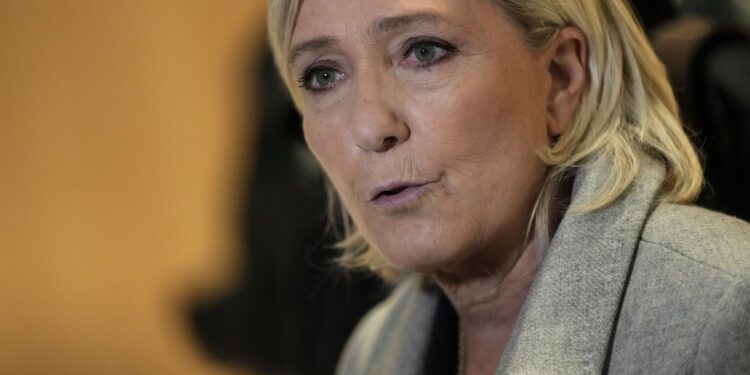PARIS — French far-right leader Marine Le Pen strongly denied committing any wrongdoing at a Paris court Monday as she and her National Rally party stand trial over the suspected embezzlement of European Parliament funds.
The nine-week trial is a critical juncture for Le Pen, expected to be a strong contender in France’s next presidential election in 2027. A guilty verdict could significantly affect her political career and aspirations.
Le Pen appeared self-confident and determined in court, stating in a loud voice: “I’m telling you very clearly: I absolutely don’t feel I have committed the slightest irregularity, the slightest illegal move.”
The National Rally and 25 of its top officials went on trial last month for having used money intended for EU parliamentary aides instead to pay staff who worked for the party between 2004 and 2016, in violation of the 27-nation bloc’s regulations. The National Rally was called the National Front at the time.
Le Pen is to answer questions from the judges until Wednesday over the use of EU money to pay for her bodyguard, her chief of staff and two other party aides.
Almost using the court as a political forum, Le Pen argued the missions of the aides paid by the European Parliament were to be adapted to the MEPs’ various activities, including some highly political missions related to the party.
She detailed at length her vision of the role of MEPs, saying it extended well beyond working at elaborating and voting on EU regulations. She listed numerous examples: promoting their views at the national level, meeting with voters, defining a strategy with other party officials, speaking in the media and attending major events.
“The aide works for his MEP and (therefore) can work for his MEP for the benefit of the party,” she insisted.
Le Pen also drew a parallel with France’s lower house of parliament. “The National Assembly is very clear: it considers the political activity is fully part of the lawmaker’s mandate.”
“I believe it’s a mistake from the European parliament not to perceive it this way,” she said.
Monday was the first time Le Pen was asked specific questions about her aides.
A lawyer by training, she followed debates with extreme attention from the outset of the long and complex trial, where she vowed to be as present as possible — frequently speaking up even when it wasn’t her turn to address the court from the defendants’ stand.
If found guilty, Le Pen and her co-defendants could face up to 10 years in prison and fines of up to 1 million euros ($1.1 million) each. Additional penalties, such as the loss of civil rights or ineligibility to run for office, could also be imposed, a scenario that could hamper, or even destroy, Le Pen’s goal to mount another presidential bid after the end of President Emmanuel Macron’s term. Le Pen was runner-up to Macron in the 2017 and 2022 presidential elections.
Two other National Rally officials, including the party’s historic leader, Le Pen’s father Jean-Marie, have faced similar accusations but have been exempted from prosecution on health grounds.
The trial is scheduled to last until Nov. 27.
It comes at a particularly bad timing for Le Pen, as some heated debates over the budget are expected in the coming weeks at the National Assembly. Some observers expect the situation could prevent National Rally lawmakers, including her, from fully playing their opposition role in Parliament as they would be busy focusing on the party’s defense.






